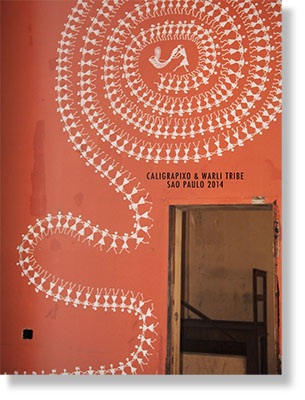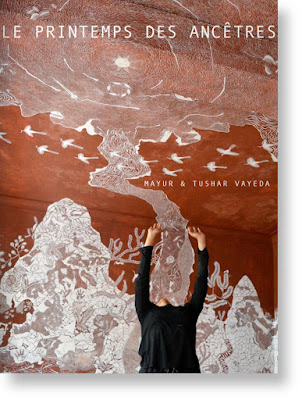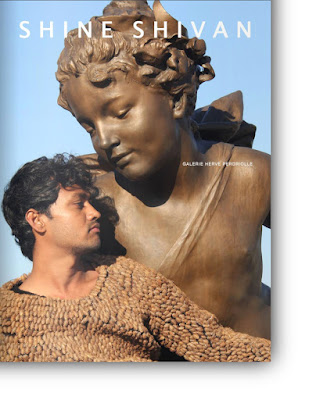Source Scroll In
The renowned costume designer Bhanu Rajopadhye Athaiya, who died on October 15, was also a trained and skilled artist. Athaiya graduated from Mumbai’s JJ School of Art in 1952. She was the only woman to have three paintings at a show by the Progressive Artists’ Group in Mumbai in 1953. In 1982, she became the first Indian to win an Oscar, for Richard Attenborough’s biopic Gandhi. Athaiya’s paintings and drawings were made between 1945 and 1952, before she set out to design costumes for Hindi films.
> read more
CONTEMPORARY ONE WORD SEVERAL WORLDS
samedi 31 octobre 2020
Vasudeo Santu Gaitonde: The Late Indian Modernist That Made A Mark In History
Source Asia Tatler by Christine Andas
In September 2020, an unprecedented victory for Indian art had occurred within the walls of Pundole, an auction house in Mumbai. The late Indian Modernist Vasudeo Santu Gaitonde's oil painting, Untitled (1974), had been sold at an auction for 4.5 million dollars, surpassing his previous record. The painting comes from the collection of Masanori Fukuoka, owner of Glenbarra Museum in Japan.
> read more
In September 2020, an unprecedented victory for Indian art had occurred within the walls of Pundole, an auction house in Mumbai. The late Indian Modernist Vasudeo Santu Gaitonde's oil painting, Untitled (1974), had been sold at an auction for 4.5 million dollars, surpassing his previous record. The painting comes from the collection of Masanori Fukuoka, owner of Glenbarra Museum in Japan.
> read more
vendredi 30 octobre 2020
How covid-19 has darkened India’s cultural season
Source Livemint by Somak Ghoshal
If winter is waiting in the wings, can India’s art and culture season be far behind? As with so much in 2020, the answer to this question is a despondent yes. If 2020 is the year of the pandemic, it is also the year of postponements, as two recent announcements drove home. Earlier this week, the Kochi-Muziris Biennale (KMB) postponed its forthcoming edition, scheduled for December, to 2021. Days ago, the organisers of the India Art Fair (IAF) also decided to move its next edition to 2022. The Jaipur Literature Festival is yet to firm up plans for 2021, though its online programming continues.
> read more
If winter is waiting in the wings, can India’s art and culture season be far behind? As with so much in 2020, the answer to this question is a despondent yes. If 2020 is the year of the pandemic, it is also the year of postponements, as two recent announcements drove home. Earlier this week, the Kochi-Muziris Biennale (KMB) postponed its forthcoming edition, scheduled for December, to 2021. Days ago, the organisers of the India Art Fair (IAF) also decided to move its next edition to 2022. The Jaipur Literature Festival is yet to firm up plans for 2021, though its online programming continues.
> read more
mercredi 28 octobre 2020
Chitra Ganesh on Utopia, Futurity, and Dissent
Source Ocula In Conversation with Jareh Das
Jareh Das :I grew up in Lagos in the 1990s where everyone watched a lot of Bollywood movies and it is still very popular. I remember Nagin (1976) centred on a female protagonist who could transform herself into a snake, and the movie follows her quest to avenge the death of her lover. I bring this up because I recall, in these movies, prominent themes of the 'avenging woman' who was also often depicted as a goddess. What themes and elements of the visual language of Bollywood movies interest you, and when did you first engage with these movies and the visual and popular culture around them?
Chitra Ganesh : It's amazing that you bring up Nagin! One of the posters for this film, in particular, has been iconic for me. Growing up in the Queens and Brooklyn boroughs of 1980s New York City—before the birth of VCRs and home movie culture—there was a local theatre that screened Bollywood films, so I actually saw the film on screen.
> read more
We will develop a digital platform to host online show: Bose Krishnamachari
Source The New Indian Express
The much-awaited fifth edition of the Kochi-Muziris Biennale (KMB) – one of South Asia’s top arts initiatives that has put India on the global contemporary art map – has been postponed to November 1, 2021 due to the raging pandemic. Bose Krishnamachari, Biennale Director, tells The Morning Standard about the unfavourable conditions in Kerala that led to this decision and participating Delhi-based art entities.
What led you to postpone KMB just one month before the opening date?
The decision to postpone the date of opening was taken at the beginning of this month, but was made public only after we had spoken to all of our artists.
> read more
lundi 12 octobre 2020
Experiments with colour at Frieze London
Source Livemint by Avantika Bhuyan
With the ongoing covid-19 pandemic, like most fairs across the world, Frieze London too has decided to go the virtual route. A wide array of forms, mediums and styles can be seen on the online viewing rooms of international galleries. Indian galleries too are adding to the discourse on how artists are interpreting the changes taking place in the world today, with their deeply personal takes on politics, gender, the environment and more. While Experimenter focuses on the body and its relationship with the space around it with Radhika Khimji, Praneet Soi, and others, Nature Morte showcases Jitish Kallat’s immersive installation, Covering Letter (terranum nuncius), as part of the Frieze Focus section, 'Possessions', curated by Zoe Whitley. The one thread that emerges from the various showcases is the focus on colour and materiality. Galleries are using this to talk about personal stories of resilience, as is evident in Vadehra Art Gallery’s display of Benodebehari Mukherjee’s rare paper-cut collages created after he lost his eyesight, or an exploration of the spiritual that Jhaveri Contemporary is showing with Prafulla Mohanti’s solo display.
> read more
With the ongoing covid-19 pandemic, like most fairs across the world, Frieze London too has decided to go the virtual route. A wide array of forms, mediums and styles can be seen on the online viewing rooms of international galleries. Indian galleries too are adding to the discourse on how artists are interpreting the changes taking place in the world today, with their deeply personal takes on politics, gender, the environment and more. While Experimenter focuses on the body and its relationship with the space around it with Radhika Khimji, Praneet Soi, and others, Nature Morte showcases Jitish Kallat’s immersive installation, Covering Letter (terranum nuncius), as part of the Frieze Focus section, 'Possessions', curated by Zoe Whitley. The one thread that emerges from the various showcases is the focus on colour and materiality. Galleries are using this to talk about personal stories of resilience, as is evident in Vadehra Art Gallery’s display of Benodebehari Mukherjee’s rare paper-cut collages created after he lost his eyesight, or an exploration of the spiritual that Jhaveri Contemporary is showing with Prafulla Mohanti’s solo display.
> read more
Inscription à :
Articles (Atom)
























